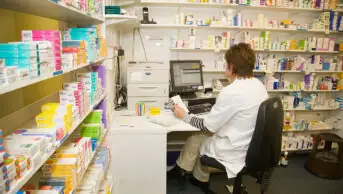
Shutterstock.com
The General Pharmaceutical Council (GPhC) has proposed updated initial education and training standards for pharmacy technicians, which include increasing their level of study.
In a consultation document, published on 1 October 2025, the regulator said it was proposing to increase the levels of study to reflect the “widening scope of a pharmacy technician’s role in the healthcare sector”.
Currently, pharmacy technicians must be educated to level 3 under the Regulated Qualifications Framework (RQF) in England and Wales, while in Scotland, pharmacy technicians must be educated to a level 6 under the Scottish Credit and Qualifications Framework (SCQF).
The GPhC has proposed to raise the levels to RQF level 4 in England and SCQF level 7 in Scotland, according to the document.
“Education starting at RQF level 4 (or SCQF level 7) involves a deeper understanding of a subject and its application in practice,” the regulator said.
“By building in more demanding academic and practical elements, we can improve trainees’ ability to meet the increasing demands of the profession. In the same way, it will make sure trainee pharmacy technicians remain equipped to deliver safe and effective care.”
It explained that the higher levels are equivalent to the first year of an undergraduate degree and are designed to “equip trainees with new skills in critical thinking and clinical decision-making, and adaptability to different and complex healthcare environments”.
Alongside the current requirement to have English and numeracy qualifications at RQF level 2 or equivalent, the regulator also proposed mandating a science subject entry requirement of at least RQF level 2 or equivalent to “increase the basic knowledge of applicants”.
RQF level 2 is equivalent to GCSE level C or above in Wales, level 4 or above in England and a level C or above at National 5 level in Scotland.
“We are conscious that this change may have implications for access to training courses and propose that the equivalent science entry requirements could include previous practice-based learning — for example, practice gained by current pharmacy support staff, including dispensing assistants and pharmacy assistants,” the GPhC said.
Another proposal included in the consultation document focuses on enabling pharmacy technicians to become “final accuracy checkers” upon registration, which means that they would perform the last check of a dispensed medicines before it is delivered to a patient.
“This means that newly registered pharmacy technicians will no longer have to undertake additional skills assessments before they can carry out final accuracy checking. They will have gained the relevant knowledge and skills during their initial education and training,” the GPhC said.
Lynsey Cleland, chief standards officer for the GPhC, said: “Pharmacy technicians play a vital role in the delivery of care from running specialised clinics to overseeing unregistered members of the pharmacy team, such as support staff.
“Pharmacy technicians are also increasingly involved in public health initiatives — this shift focuses on proactive care to improve community health outcomes. The extension beyond traditional dispensing duties can also be seen through pharmacy technicians’ roles in delivering online and homecare services.
“We need to consider ongoing changes in healthcare to ensure that the initial education and training of pharmacy technicians is appropriate and reflective of what is expected in practice.”
A spokesperson for the Association of Pharmacy Technicians UK (APTUK) said that the association “warmly welcomes” the consultation.
“This consultation arrives at a pivotal moment for the profession, offering a unique opportunity to shape the future of pharmacy technician education in alignment with the multi-professional four pillars of practice — clinical practice, leadership, education and research,” they said.
“APTUK encourages everyone — whether you’re a trainee, employer, educator or practicing pharmacy technician — to actively engage with the consultation. Your voice matters in shaping a robust, future-ready framework that supports career progression, personal development and excellence in patient care.”
The GPhC’s initial education and training standards for pharmacy technicians were last updated in 2017.
The consultation closes on 24 December 2025.


